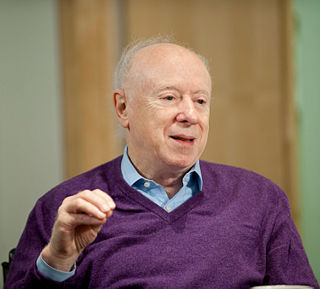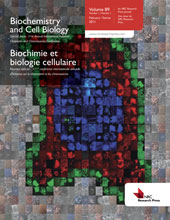Related Research Articles

Joseph Leonard Goldstein ForMemRS is an American biochemist. He received the Nobel Prize in Physiology or Medicine in 1985, along with fellow University of Texas Southwestern researcher, Michael Brown, for their studies regarding cholesterol. They discovered that human cells have low-density lipoprotein (LDL) receptors that remove cholesterol from the blood and that when LDL receptors are not present in sufficient numbers, individuals develop hypercholesterolemia and become at risk for cholesterol related diseases, notably coronary heart disease. Their studies led to the development of statin drugs.
A biomedical scientist is a scientist trained in biology, particularly in the context of medical laboratory sciences or laboratory medicine. These scientists work to gain knowledge on the main principles of how the human body works and to find new ways to cure or treat disease by developing advanced diagnostic tools or new therapeutic strategies. The research of biomedical scientists is referred to as biomedical research.

The American Society for Biochemistry and Molecular Biology (ASBMB) is a learned society that was founded on December 26, 1906, at a meeting organized by John Jacob Abel. The roots of the society were in the American Physiological Society, which had been formed some 20 years earlier. ASBMB is the US member of the International Union of Biochemistry and Molecular Biology.
William R. "Bill" Brinkley, was an American cellular biologist and scientific advocate and served as a Professor and Dean of the Graduate School of Biomedical Sciences at Baylor College of Medicine. Brinkley was recognized particularly for contributing to discovery of the attachment of chromosomes to the mitotic spindle apparatus.
The American Society for Bone and Mineral Research (ASBMR) is a professional, scientific and medical society established in 1977 to promote excellence in bone and mineral research and to facilitate the translation of that research into clinical practice. The ASBMR has a membership of nearly 4,000 physicians, basic research scientists, and clinical investigators from around the world.
The American Physiological Society is a non-profit professional society for physiologists. It has nearly 10,000 members, most of whom hold doctoral degrees in medicine, physiology, or other health professions. Its mission is to support research and education in the physiological sciences. The society publishes 16 peer-reviewed journals, sponsors scientific conferences, and sponsors awards to further this mission.
The American Society for Pharmacology and Experimental Therapeutics (ASPET) is a scientific society founded in late 1908 by John Jacob Abel of Johns Hopkins University, with the aim of promoting the growth of pharmacological research. Many society members are researchers in basic and clinical pharmacology who help develop disease-fighting medications and therapeutics. ASPET is one of the constituent societies of the Federation of American Societies for Experimental Biology (FASEB). The society's headquarters are in Rockville, MD. The current president is Michael F. Jarvis.
Thomas Dean Pollard is a prominent educator, cell biologist and biophysicist whose research focuses on understanding cell motility through the study of actin filaments and myosin motors. He is Sterling Professor Emeritus of Molecular, Cellular & Developmental Biology and a professor emeritus of cell biology and molecular biophysics & biochemistry at Yale University. He was dean of Yale's Graduate School of Arts and Sciences from 2010 to 2014, and president of the Salk Institute for Biological Studies from 1996 to 2001.
The Genetics Society of America (GSA) is a scholarly membership society of more than 5,500 genetics researchers and educators, established in 1931. The Society was formed from the reorganization of the Joint Genetics Sections of the American Society of Zoologists and the Botanical Society of America.
Several universities have designed interdisciplinary courses with a focus on human biology at the undergraduate level. There is a wide variation in emphasis ranging from business, social studies, public policy, healthcare and pharmaceutical research.

Biochemistry and Cell Biology is a bi-monthly, peer-reviewed scientific journal of biochemistry and cell biology established in 1964 by NRC Research Press. It is the continuation of Canadian Journal of Biochemistry and Physiology which split into Canadian Journal of Biochemistry and Canadian Journal of Physiology and Pharmacology in 1964. In 1983, Canadian Journal of Biochemistry was renamed Canadian Journal of Biochemistry and Cell Biology and acquired its current name Biochemistry and Cell Biology in 1986.
The American Society for Investigative Pathology (ASIP) is a society of biomedical scientists who investigate mechanisms of disease. ASIP membership includes scientists in the academic, government, hospital, and pharmaceutical arenas that focus their research on the pathogenesis, classification, diagnosis and manifestations of disease. Research findings are ultimately used in the understanding, diagnosis and treatment of human diseases. The word pathology is derived from the Greek word "pathos" meaning "disease."

Aviv Regev is a computational biologist and systems biologist and Executive Vice President and Head of Genentech Research and Early Development in Genentech/Roche. She is a core member at the Broad Institute of MIT and Harvard and professor at the Department of Biology of the Massachusetts Institute of Technology. Regev is a pioneer of single cell genomics and of computational and systems biology of gene regulatory circuits. She founded and leads the Human Cell Atlas project, together with Sarah Teichmann.
The Histochemical Society (HCS) is an academic society that was founded on March 24, 1950 at a meeting organized by Ralph D. Lillie of the National Institutes of Health. The idea for the Society arose during the 1949 Biological Stain Commission meeting at which a symposia encompassing anatomy, cytology, pathology and biochemistry was proposed by Lillie, Charles Leblond and Edward Dempsey. Lillie became the first editor of HCS's journal, Journal of Histochemistry and Cytochemistry.
Life Sciences Switzerland (LS2) is the Swiss federation of scientific societies for life sciences. It was formerly known as the Union of the Swiss Societies for Experimental Biology (USGEB). It was founded in 1969, with the founding meeting taking place in Bern, Switzerland. At the founding, four societies, Swiss Society for Physiology, Swiss Society for Biochemistry, Swiss Society for Pharmacology and Swiss Society for Cell & Molecular Biology comprised the original societies.

Lynne Elizabeth Maquat is an American biochemist and molecular biologist whose research focuses on the cellular mechanisms of human disease. She is an elected member of the American Academy of Arts and Sciences, the National Academy of Sciences and the National Academy of Medicine. She currently holds the J. Lowell Orbison Endowed Chair and is a professor of biochemistry and biophysics, pediatrics and of oncology at the University of Rochester Medical Center. Professor Maquat is also Founding Director of the Center for RNA Biology and Founding Chair of Graduate Women in Science at the University of Rochester.

The Archives of Biological Sciences is a multidisciplinary journal that covers original research in a wide range of subjects in life science, including biology, ecology, human biology and biomedical research.
Robert J. Cousins is an American nutritional biochemist who has researched the metabolism of heavy metals, especially zinc. He has served as president of the Federation of American Societies for Experimental Biology (FASEB) and the American Society for Nutrition (ASN). He was recognized with membership in the National Academy of Sciences in 2000 and served as editor of the Annual Review of Nutrition for ten years.